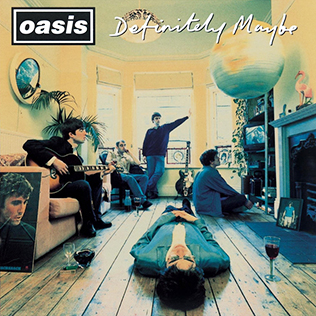
Definitely Maybe is the debut studio album by English rock band Oasis, released by Creation Records on 29 August 1994. The album features Noel Gallagher on lead guitar, backing vocals and as chief songwriter, Liam Gallagher on lead vocals, Paul "Bonehead" Arthurs on rhythm guitar, Paul "Guigsy" McGuigan on bass guitar and Tony McCaroll on drums.

Oasis were an English rock band formed in Manchester in 1991. Originally known as the Rain, the group initially consisted of Liam Gallagher, Paul Arthurs (guitar), Paul McGuigan and Tony McCarroll (drums), with Liam's older brother Noel Gallagher joining as a fifth member a few months after their formation. Noel became the de facto leader of the group and took over the songwriting duties for the bands first four albums.

Heathen Chemistry is the fifth studio album by English rock band Oasis. It was released on 1 July 2002 by Big Brother Recordings. It is the first Oasis studio album recorded with guitarist Gem Archer and bassist Andy Bell, who both joined the band after work on previous album Standing on the Shoulder of Giants had been completed. It is the last album to feature longtime drummer, Alan White, who left in early 2004, with Noel Gallagher citing White's lack of commitment to the band as the reason for leaving.

Urban Hymns is the third studio album by English alternative rock band the Verve, released on 29 September 1997 on Hut Records. It earned nearly unanimous critical praise upon its release, and went on to become the band's best-selling release and one of the biggest selling albums of the year. As of 2019, Urban Hymns is ranked the 19th best-selling album in UK chart history and has sold over ten million copies worldwide. This is the only Verve album to feature guitarist and keyboardist Simon Tong, who initially joined the band to replace their original guitarist Nick McCabe. McCabe rejoined the band soon after, however, and Tong remained in the band also considered as the fifth member; this makes the album the only one that the band recorded as a five-piece.
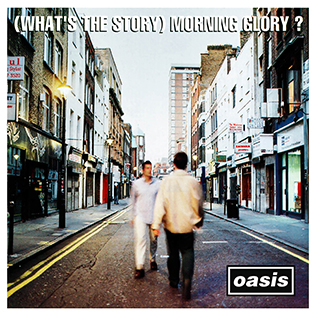
(What's the Story) Morning Glory? is the second studio album by English rock band Oasis. Released on 2 October 1995 by Creation Records, it was produced by Owen Morris and the group's lead guitarist and chief songwriter Noel Gallagher. The structure and arrangement style of the album was a significant departure from the band's previous album, Definitely Maybe (1994). Gallagher's compositions were more focused in balladry and placed more emphasis on "huge" choruses, with the string arrangements and more varied instrumentation contrasting with the rawness of the group's debut album. Morning Glory was the group's first album with drummer Alan White, who replaced Tony McCarroll.

The Masterplan is a compilation album by English rock band Oasis. It was released on 2 November 1998 by Creation Records, the band's final release through the label. It comprises B-sides which never made it onto an album up to that point. Originally intended for release only in areas such as the United States and Japan, where the tracks were previously only available on expensive European-import singles, The Masterplan reached number 2 in the UK, where it initially went platinum, and number 51 in the United States. However, it did reach the Top 20 in various charts around the world, going on to sell 3 million copies. It has since been certified triple platinum in the UK. Four songs from the album appear on the 2006 compilation album Stop the Clocks.
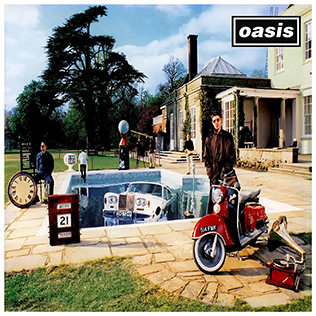
Be Here Now is the third studio album by English rock band Oasis, released on 21 August 1997 by Creation Records. The album was recorded at multiple recording studios in London, including Abbey Road Studios, as well as Ridge Farm Studio in Surrey. Although most tracks retain the anthemic quality of previous releases, the songs on Be Here Now are longer and contain many guitar overdubs. Noel Gallagher said this was done to make the album sound as "colossal" as possible. The album cover features a shot of the band members at Stocks House in Hertfordshire. It is the last Oasis studio album to feature founding members guitarist Paul "Bonehead" Arthurs and bassist Paul "Guigsy" McGuigan as the two left in 1999.

Standing on the Shoulder of Giants is the fourth studio album by English rock band Oasis, released on 28 February 2000. It was the band's first album under their new record label Big Brother Recordings. In the year preceding the album's release, Alan McGee closed Creation Records, and Oasis had lost two founding members and hired new producer Mark "Spike" Stent to replace Owen Morris.

Familiar to Millions is a live album by English rock band Oasis. It was released on 13 November 2000 by Big Brother Recordings. The album was recorded at Wembley Stadium on 21 July 2000. It debuted at No. 5 in the UK charts with 57,000 copies sold in the first week. To date Familiar to Millions has sold around 310,000 copies in Britain alone (Platinum), about 70,000 copies in the United States and an estimated 1 million copies worldwide. The album was initially released simultaneously on six formats: DVD, VHS, double CD, double cassette, triple vinyl, and double MiniDisc, with different coloured cover art depending on format - the version of the cover art depicted in the infobox to the right of this article is the vinyl version.

"Lyla" is a song by the English rock band Oasis. It was released in May 2005 as the first single from their sixth studio album, Don't Believe the Truth (2005). "Lyla" was the band's first single following the departure of their long-time drummer Alan White, and replaced by Ringo Starr's son and the Who drummer Zak Starkey as an additional drummer of the band.

"Supersonic" is a song by English rock band Oasis, released as their debut single on 11 April 1994. It appeared on their debut studio album, Definitely Maybe (1994). The single reached number 31 on the UK Singles Chart, number two on the UK Independent Singles Chart, and number 11 on the US Billboard Modern Rock Tracks chart. It also charted in the top 30 in Ireland and New Zealand, as well as the top 40 in Scotland and France.

"Let There Be Love" is a song by English rock band Oasis from their sixth studio album, Don't Believe the Truth (2005). Written by Noel Gallagher, it is the third and the last Oasis song to feature Liam and Noel on lead vocals, the first being "Acquiesce" and the second being "Put Yer Money Where Yer Mouth Is". It was released on 28 November 2005 as the third and final single from the album in the United Kingdom and as the second single in the United States.

"The Importance of Being Idle" is a song by English rock band Oasis. It was released on 22 August 2005 in the UK as the second single from their sixth studio album, Don't Believe the Truth (2005), written, produced, and sung by lead guitarist Noel Gallagher. The song was written by Gallagher in the mid-2004, before the band made their final attempt at recording what would become Don't Believe the Truth.

The discography of the English rock band Oasis consists of seven studio albums, two live albums, five compilation albums, six video albums, one extended play, twenty seven singles which includes one double single, nineteen promotional singles and thirty-six music videos. As of 2024, the band have sold 75 million records worldwide, and been cited by Guinness World Records as the most successful act in the United Kingdom between the years 1995 and 2005. Oasis had 22 consecutive UK top 10 hits between 1994 and 2008. Oasis was formed in 1991 by vocalist Liam Gallagher, guitarist Paul "Bonehead" Arthurs, bassist Paul "Guigsy" McGuigan and drummer Tony McCarroll – they were later joined by guitarist and songwriter Noel Gallagher. The band signed to Creation Records in May 1993 and released their debut single "Supersonic" the following year; it peaked at number 31 in the United Kingdom. Follow-up singles "Shakermaker" and "Live Forever" became UK top 15 hits, with the latter also attaining success in the United States. Definitely Maybe, the band's debut studio album, topped the UK Albums Chart and went on to be certified eight times platinum by the British Phonographic Industry (BPI).

Stop the Clocks is a compilation album by English rock band Oasis. It was released on 20 November 2006 by Big Brother Recordings. The "retrospective collection" is an 18-track double album with the featured songs chosen by Noel Gallagher. It went 5× Platinum in the United Kingdom.
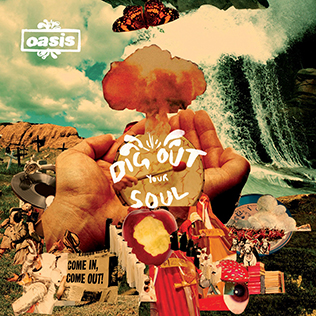
Dig Out Your Soul is the seventh and final studio album by English rock band Oasis. It was released on 6 October 2008 by Big Brother Recordings. The album was recorded between August and December 2007 at Abbey Road Studios in London, and mixed in January and March 2008 at The Village Recorder in Los Angeles. Production was handled by Dave Sardy who had previously produced much of the group's sixth studio album, Don't Believe the Truth (2005). Lead guitarist Noel Gallagher wrote a majority of the songs, while three were written by Liam Gallagher as well as one contribution each from Gem Archer and Andy Bell.

Time Flies... 1994–2009 is a compilation album by English rock band Oasis. Released on 14 June 2010 by Big Brother Recordings, the album contains all 27 UK singles released by the band between 1994 and 2009, including "Whatever" and "Lord Don't Slow Me Down", which had previously never appeared on an Oasis studio album. "Sunday Morning Call" is not listed anywhere on the artwork but appears as a hidden track on track 14 of the second disc.

"Don't Look Back in Anger" is a song by English rock band Oasis. It was written by the band's lead guitarist and chief songwriter Noel Gallagher. The song was produced by Gallagher and Owen Morris. Released on 19 February 1996 as the fifth single from their second studio album, (What's the Story) Morning Glory? (1995), it became Oasis's second single to reach number one on the UK Singles Chart, earning a quintuple-platinum sales certification in the UK. It was the first Oasis single with lead vocals by Noel, who had previously only sung lead on B-sides, instead of his brother Liam. Noel would later sing lead vocals on six other singles.
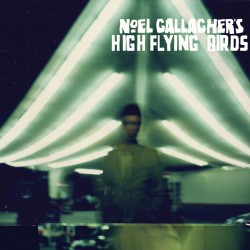
Noel Gallagher's High Flying Birds is the debut studio album by English rock band Noel Gallagher's High Flying Birds. Released on 17 October 2011, it is the first studio album released by frontman Noel Gallagher since his departure from Oasis in August 2009 and the group's eventual dissolution.

Who Built the Moon? is the third studio album by English rock band Noel Gallagher's High Flying Birds. Produced by David Holmes, it was released on 24 November 2017, through Gallagher's label Sour Mash Records. Four singles were released from the album; "Holy Mountain", "It's a Beautiful World", "She Taught Me How to Fly" and "If Love Is the Law".




















